
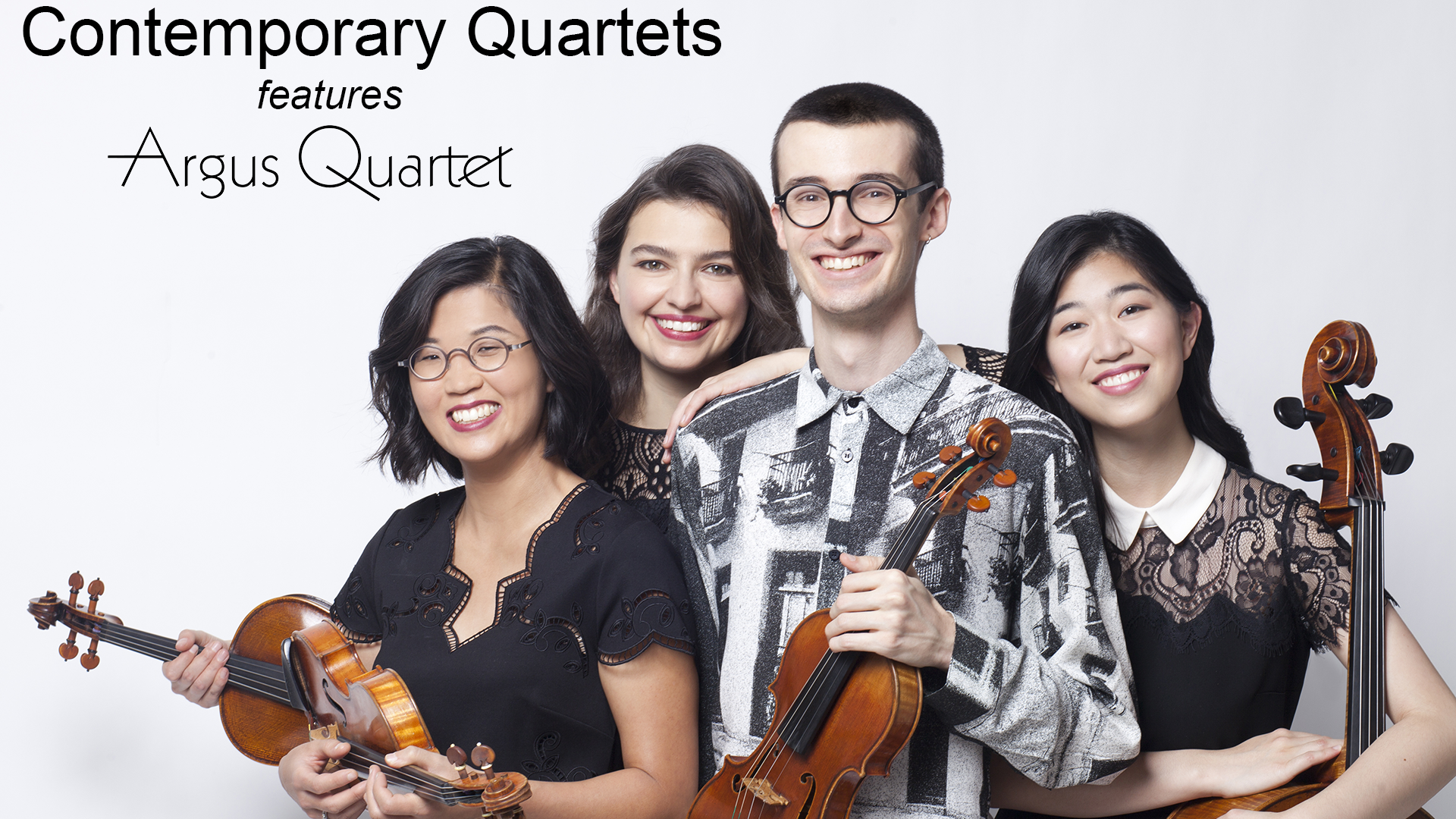
Contemporary Quartets
featuring
Argus Quartet
January 17, 2022 - Argus Quartet performing the works of Augusta Bates, Jane Brockman, Jerry Casey, Jenny Game, and Igor Korneitchouk.
Contemporary Quartets Project is creating a new way to produce contemporary String Quartets
The live recorded virtual concert of Argus Quartet will be broadcasted on January 17, 2022 at 5:00 PM EST
The Argus Quartet is dedicated to encouraging the joys of human connection, community, and discovery by bringing a wide-ranging repertoire to life through bold and meaningful programming and a vibrant commitment to collaboration and education, winning recognition as a “vivacious foursome … [that] plays canonical standards with authority and verve and approaches modern music with care and assurance” (The New Yorker). Praised for playing with “supreme melodic control and total authority” and “decided dramatic impact” (Calgary Herald), the Quartet has quickly emerged as one of today’s most dynamic and versatile ensembles, winning First Prize at both the 2017 M-Prize Chamber Arts Competition and the 2017 Concert Artists Guild Victor Elmaleh Competition.
Argus has worked with many of today’s leading musical voices, including Martin Bresnick, Chris Cerrone, Ted Hearne, Garth Knox, Andrew Norman, Christopher Theofanidis, and Augusta Read Thomas. Recent commissions include new quartets by Katherine Balch, Donald Crockett, GRAMMY nominee Eric Guinivan, Hermitage Prize winner Thomas Kotcheff, and Guggenheim Fellowship recipient Juri Seo. Argus’s recording of Seo’s works for string quartet was released in May 2019 on Innova Recordings. The Quartet has received grants from the Koussevitsky Foundation, Chamber Music America, and the Caramoor Center for Music and the Arts in support of their commissioning efforts.
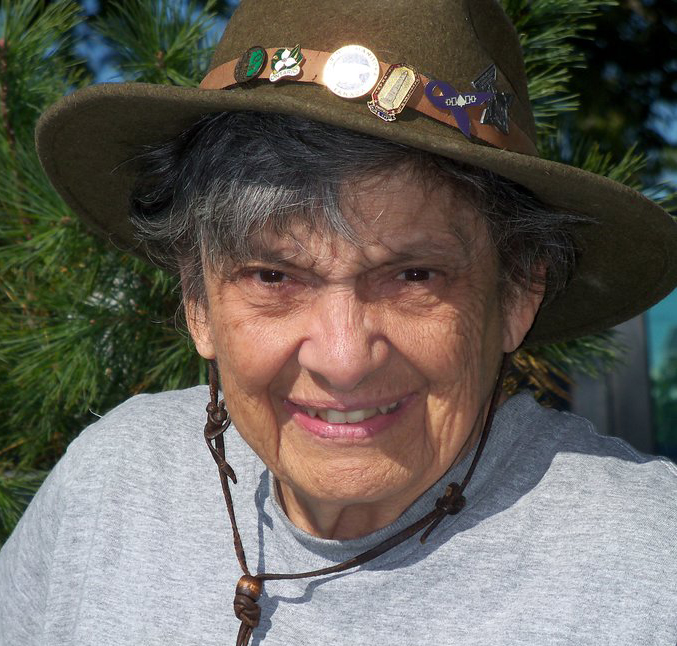
From the Tug Hill: Spring Peepers
Augusta Cecconi Bates
My life as a composer began at the early age of 6 – I am now 88.
I earned B.A. Music Theory 1956 Syracuse University, M.A. Music History 1960. Syracuse University, and an Honorary Doctorate (Italian) 1992.
I have written over 300 compositions for small ensembles, orchestras, choruses, instrumental and vocal soloists and ensembles, 4 operas, including "Molly of the Mohawks" which has had over a dozen performances since 2008. The libretto and score are of my composing.
I received a prize for string quartet in 1976, in 2006 Ist Prize for Wind Ensemble w/ Clarinet Solo –BWWGroup and in 2021 1st Honorable Mention: "Pasticcio" Wind Ensemble The American Prize
Presently employed as organist for two local churches, where my gift at improvisation serves to good use.
Spring Peepers from the Tug Hill Plateau is one of the 5 movements composed for string quartet. Describing musically that geographic area of New York State in the western foothills of the Adirondack Mts. The area receives the greatest annual snowfall east of the Rockie Mts.
As the snow finally melts and the ground softens, the myriad of tree toads begin their calls. at first, only in the evenings, but soon, at the height of their mating season the cacophonous sound is unceasing day and night. The Tug Hill is the part of New York State in the western foothills of the Adirondack Mts. -- where the annual snowfall is the greatest east of the Rockies.
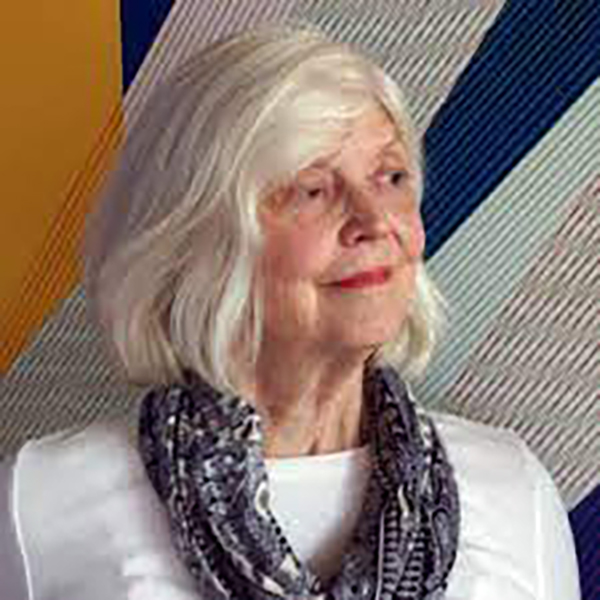
Beneath the Surface of a Sea of Silence
Jane Brockman
Brockman holds a Doctorate in Music Composition from the University of Michigan, Ann Arbor, studied in Paris on a Fulbright/Alliance Française Fellowship, and worked in Vienna on a Rackham Prize. Awards and honors include the Mac Dowell Colony, State of Connecticut, the Sundance Institute, Sigvald Thompson Prize for orchestral composition, and the Composers Conference.
She was Associate Professor of Music Composition and Theory at the University of Connecticut, Storrs, and the Hartt School of Music/University of Hartford, and taught at the University of Rhode Island.
Her works are recorded on the AIX (DVD), Leonarda, Opus One, Coronet, Drimala, Centaur and Capstone labels and distributed by Theodore Front Musical Literature.
She has served on the Board of Directors of Composers Concordance (NYC), Women in Film, and the Society of Composers and Lyricists in LA, and is CEO/director of Music & Conversations, Inc., a 501-c3 chamber music concert series.
beneath the surface of a sea of silence
The world is the ever-changing foam
that floats on the surface of a sea of silence.
Rabindranath Tagore, Fireflies
An immersive musical meditation which hopes to take listeners deep beneath the surface. Gliding past weightless creatures and slithering shapes in magical otherworldly landscapes.
Upon re-entry, our world may feel as ephemeral as Tagore’s “ever-changing foam.”
Premiered by the Lyris Quartet Alyssa Park, Shalini Vijayan, Luke Maurer, Timothy Loo May 5, 2012 in Los Angeles © 2012 by Diaphanous Music
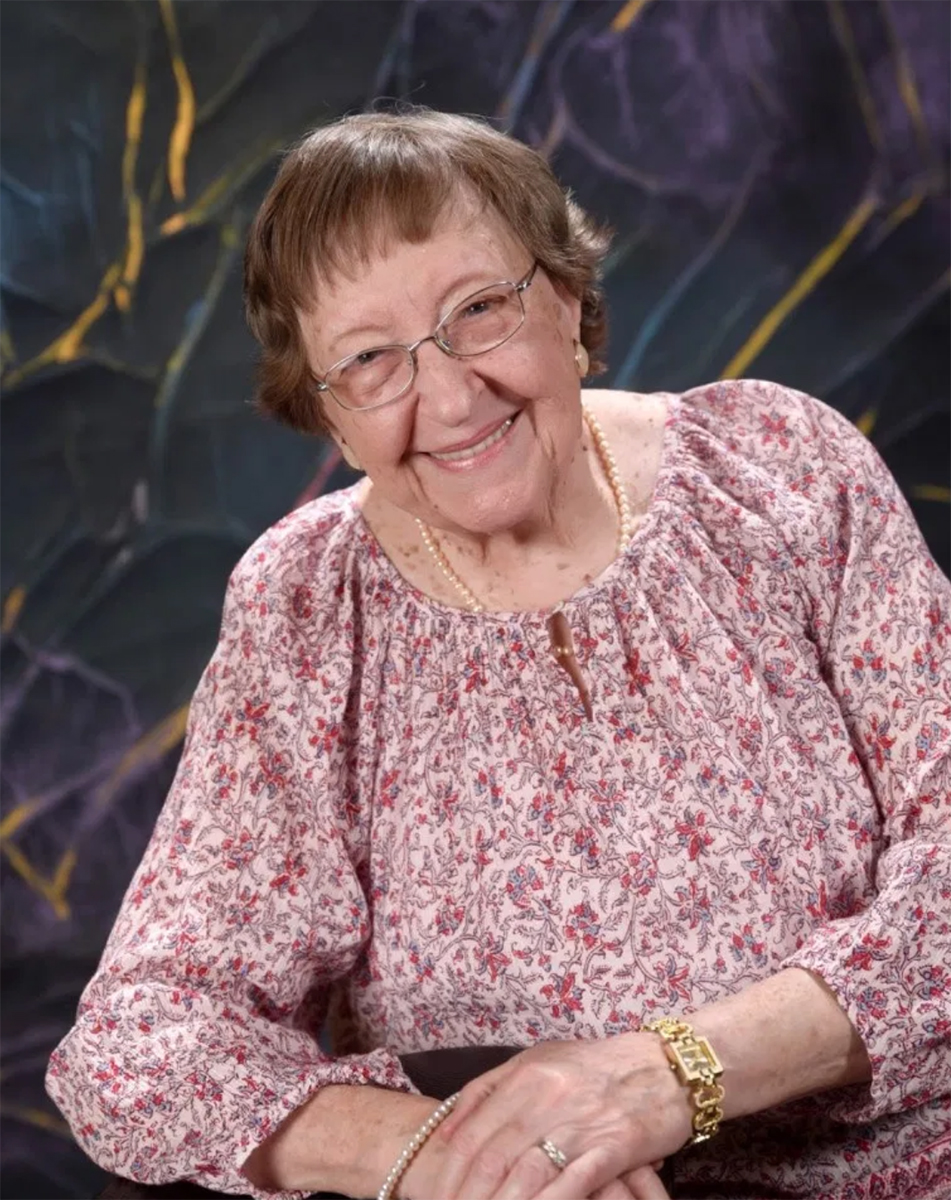
One, Yet Different
Jerry Casey
Jerry Casey, Naples, Florida, who has composed works in all genres, was the featured guest composer for the McConnell Arts Center Chamber Orchestra, Worthington, Ohio, Antoine Clark, director, which performed her work, The Musicians of Bremen. She was awarded the 2009 Marilynn Etzel Piano Commission by the Iowa Composers Forum. Out of the Depths premiered in Iowa. Her music has been performed across the U.S.A. and in England, Spain, and Slovakia.
The MMC label released a CD containing her Seven (A Suite for Orchestra) and Gli intrighi d’amore for Woodwind Quintet/Narrator. She released a CD, Yet, I Will Rejoice, containing her choral and vocal chamber music. Her recordings are heard regularly on internet radio. She has received the ASCAPLUS Award for 20 years.
Mrs. Casey was on the faculty at University of the Cumberlands, Williamsburg, Kentucky, and was an adjunct teacher at Florida Southwestern State College, Ft. Myers, Florida.
This work was commissioned by the Ohio Federated Music Clubs to celebrate the 100th anniversary of the founding of the National Federated Music Clubs. Music, a unifying force, is expressed in many differing ways. This thought, central to the National Federated Music Clubs, is this work’s basis. Opening with unison pitches in fanfare-like manner the intervals gradually grow wider leading to the opening theme in the first violin accompanied by sustained fifths in the cello with the second violin and viola offering syncopated pizzicato chords. The cello and first violin exchange roles. Finally the two inner instruments play the theme in unison with the outer ones adding the punctuated chords. Descending pizzicatos lead to sustained chords by the lower strings while the first violin plays a lengthy cadenza-like melody. The final section is in fugato-style using the melody of the NFMC national hymn, "Lasst uns erfreuen," as thematic material. The ending is the opening in retrograde, the final note being in unison as it was in the beginning.
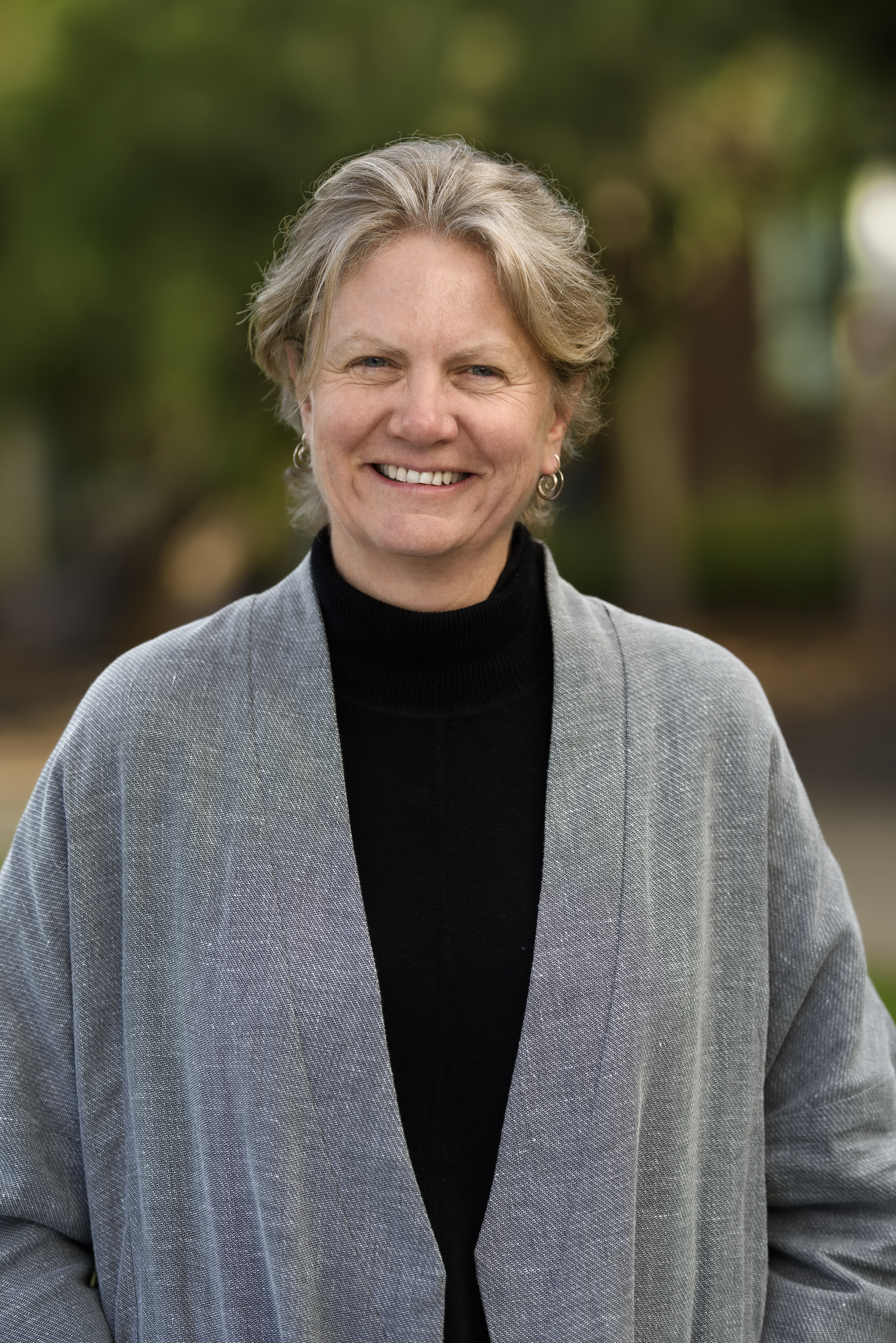
Marianne
Jenny Game
Dr Jenny Game is Dean Academic at Australia’s JMC Academy where she leads the creative practice research team. She has been composing and performing for over thirty years and has released three CDs/DVDs as performer/composer. She composes across diverse musical styles and genres from the concert hall to the circus: her intercultural chamber opera The Aqueduct was premiered at the Restrung Chamber Music festival at the Powerhouse in Brisbane in 2013. In 2019, Jenny composed the music for the highly celebrated circus production of Dispersion, directed by Zebastian Hunter (Circque du Soleil).
In March 2021, she performed three new works in the multimedia performance Windows of Longing with her contemporary new music ensemble Aurora Lumina that she leads on saxophone, at Yarra-me Djila Theatrette in Melbourne. On April 27 2021, her new composition 860, A poem by Emily Dickinson premiered at the Louise Hanson Dyer Auditorium, University of Melbourne.
Work began on Marianne in Melbourne, Australia the during the pandemic lockdowns of 202o and it was completed during 2021 lockdowns. It is a two-movement, contemplative, lyrical work that focuses on melodic expression and exploration. The first movement develops the opening five-bar melody and takes full advantage of the wide range of the cello. The cello continues as the lead instrument throughout the movement. The second movement similarly begins on the cello, but the melodies are shared in turn by all instruments. This movement has nostalgic references to traditional contrapuntal techniques including invertible counterpoint and canon, and develops to include jazz-influenced and other harmonic textures. The selection of both early and contemporary techniques was intended to metaphorically link the current pandemic to past ones.
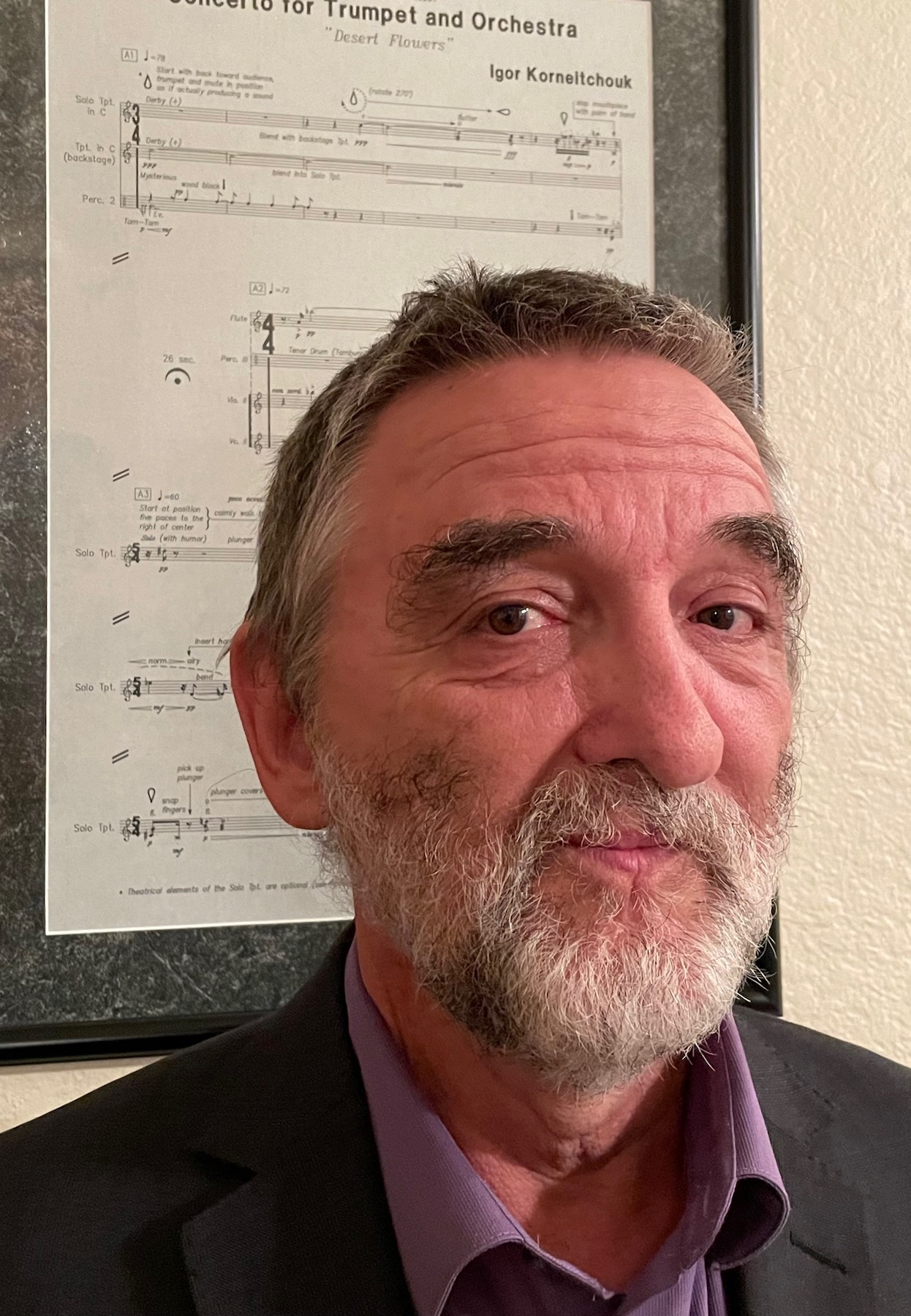
Six Frames for String Quartet
Igor Korneitchouk
I started composing about 40 years ago, after the high water mark of the 60's and '70's when I became very excited about "experimental music". My interest led me to graduate studies at UCSD, an important epicenter of this music. I stayed in San Diego, started a family, and got a job teaching - and I think that inexorably rounded out my hard experimental edge. Soon I began to see connections from the new music I loved to the pop and ethnic cultures of my students, as well as connections to my own classical musical training. While still imagining myself as being musically relevant as a composer, I feel I became more significant as a music teacher and mentor, more interested in helping students find their own unique musical voices than pushing my own agenda. Nonetheless I continue writing, even now after having recently retired and pursuing critical environmental work
Six Frames for String Quartet was written when I was 23 years old, about 40 years ago. It represents my first best attempt to push out into that world of experimental musical techniques that fascinated me. In 1980 it was selected as part of the Young Audiences Program and performed throughout the Cleveland area elementary and high schools. The piece is intended to be like “sonic photographs” each of a different subject. But all I remember was that the opening musical gesture was of a car crash from a dream, though in fact I don’t recall having been then or even now in such accidents.
